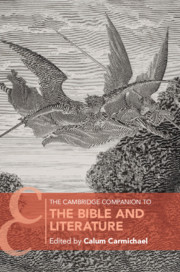Book contents
- The Cambridge Companion to the Bible and Literature
- Cambridge Companions to Religion
- The Cambridge Companion to the Bible and Literature
- Copyright page
- Contents
- Contributors
- Abbreviations
- Introduction
- 1 Literature in the Ancient Near East and the Bible
- 2 The Primary Narrative (Genesis through 2 Kings)
- 3 Reading Biblical Literature from a Legal and Political Perspective
- 4 Biblical Law and Literature
- 5 Kings, Prophets, and Judges
- 6 Prophetic Literature
- 7 Wisdom Literature
- 8 The Gospels
- 9 Paul’s Letters
- 10 Apocalyptic Literature
- 11 Shakespeare’s King Lear and the Bible
- 12 The Bible and John Milton’s Paradise Lost
- 13 The Bible, Shelley, and English Romanticism
- 14 Herman Melville and the Bible
- 15 The Song of Songs and Two Biblical Retellings
- Index
- Other Titles in the Series
- References
7 - Wisdom Literature
Published online by Cambridge University Press: 13 March 2020
- The Cambridge Companion to the Bible and Literature
- Cambridge Companions to Religion
- The Cambridge Companion to the Bible and Literature
- Copyright page
- Contents
- Contributors
- Abbreviations
- Introduction
- 1 Literature in the Ancient Near East and the Bible
- 2 The Primary Narrative (Genesis through 2 Kings)
- 3 Reading Biblical Literature from a Legal and Political Perspective
- 4 Biblical Law and Literature
- 5 Kings, Prophets, and Judges
- 6 Prophetic Literature
- 7 Wisdom Literature
- 8 The Gospels
- 9 Paul’s Letters
- 10 Apocalyptic Literature
- 11 Shakespeare’s King Lear and the Bible
- 12 The Bible and John Milton’s Paradise Lost
- 13 The Bible, Shelley, and English Romanticism
- 14 Herman Melville and the Bible
- 15 The Song of Songs and Two Biblical Retellings
- Index
- Other Titles in the Series
- References
Summary
“Wisdom Literature” is a scholarly inference from the common interest of three biblical books: ḥokmah (wisdom). They promote universal human values, lack anything specific to Israel, and convey “parental” advice. Proverbs resembles sound bites, the book of Job debates the problem of innocent suffering, and Qoheleth (the name of the author of Ecclesiastes) views life philosophically as toilsome and pointless. Two other books, Sirach and Wisdom of Solomon, resemble Proverbs while integrating Jewish traditions from law and prophecy into their teachings about wisdom. These books are mainly poetry, although a prose account frames the book of Job, Qoheleth mixes prose and poetry, and Proverbs uses prose to describe a successful seduction. Only the divine speeches in Job surpass his initial curse of his birthday, Qoheleth’s two poems about cyclical reality and declining years of life, and the description of primordial Wisdom. Within parallel utterances or cola, numerous poetic devices both tease and delight.
- Type
- Chapter
- Information
- The Cambridge Companion to the Bible and Literature , pp. 114 - 130Publisher: Cambridge University PressPrint publication year: 2020
References
Further Reading
- 1
- Cited by

